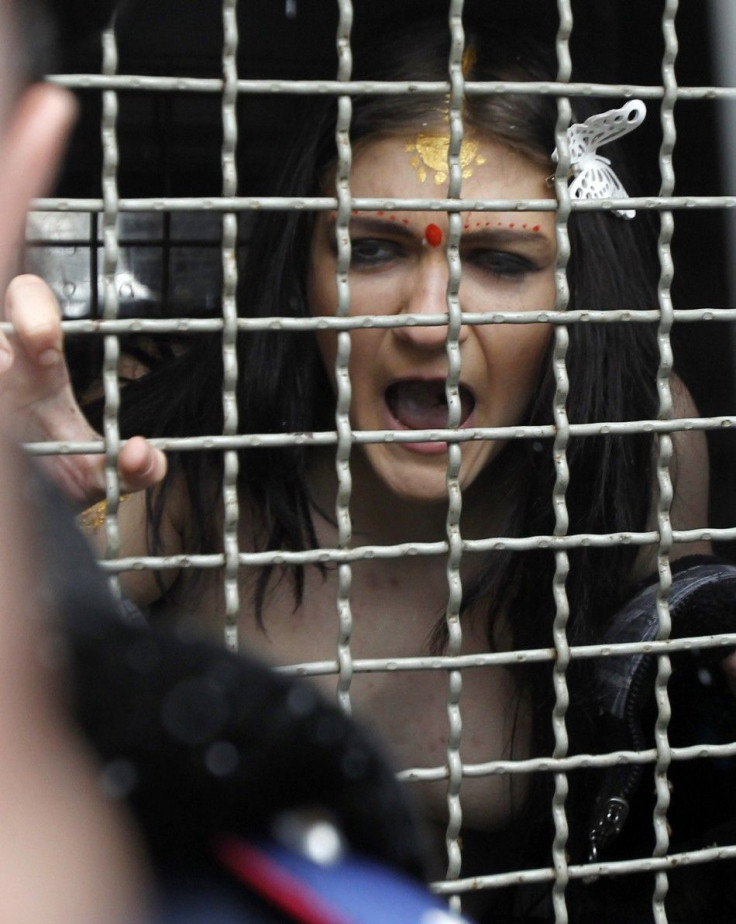India Seeks to Ban Sex Workers from Former Soviet States
ANALYSIS

A bizarre protest demonstration a few weeks ago in the Ukraine highlighted an unusual type of migration that does not receive much attention in western media – the mass movement of sex workers and prostitutes from Eastern Europe and Central Asia into India.
The protest in Kiev, in freezing temperatures, involved four topless female members of a feminist group called Femen who were outraged that the Indian government has apparently regarded many female migrants from places like the Ukraine as “prostitutes.”
According to Indian media, the New Delhi government seeks to reduce the number of immigrants from the former Soviet Union who come to work in India’s vast sex industry.
The Indian foreign ministry had specifically ordered its missions in Central Asia to “screen” visa-seekers in order to filter out those they suspected wanted to go to India to work as prostitutes.
The Times of India, quoting a government source, reported: “Indian missions in the region have been in touch with [government headquarters in New Delhi]...and it has been conveyed to them to thoroughly screen applications of women who are 15-40 years of age.”
Women visa applicants of that age from Kazakhstan, Kyrgyzstan, Russia and Ukrainian will come under particular attention under the new policy, the report noted.
Demonstrating outside the home of the Indian envoy in Kiev, the Femen protesters held up placards which read: “I am not a prostitute,” “Ukraine is not a brothel,” “Delhi, close your brothels,” and “We demand apologies!”
Femen also released the following statement: “The problem of prostitution in India is not dependent on women from Ukraine, Russia or Kazakhstan. Indian prostitution is directly conducted with impunity [by] the country’s criminal business. Blaming it on women is a shame for the heirs of such a rich and old culture,”
Femen charged the Indian government with seeking to humiliate and insult all women.
However, the Indian mission in Ukraine has denied that women visa applicants will come under heavy scrutiny.
The embassy has noticed reports in local media, according to which applications for visas from women undergo additional checks, read an Indian embassy statement.
All visas are issued after undergoing standard procedures, which are common for most diplomatic missions.”
In fact, the Indian Embassy cited that from 2010 to 2011 the number of visas issued to Ukrainians rose from 13,000 to 20,000.
Still, foreign sex workers are enjoying a booming business in India.
According to Indian officials, there are up to 3,500 sex workers from the former Soviet Union plying their trade in New Delhi alone. Every year, Indian receives about 45,000 tourists from Central Asia and 70,000 from Russia.
The Indian government apparently has no desire to cut down on normal tourists. “There is no question of it being a deterrent, though, for visitors as all care will be taken to ensure that no genuine tourist is denied a visa,” the New Delhi source told Times of India.
An official at the Russian embassy in India told the RIA Novosti state news agency that detentions of Russian sex workers in Indian is actually is very rare. He also noted that all women from the former Soviet states are called ”Russians” in India, regardless of nationality.
Indian media noted that the alleged clampdown on foreign sex workers comes just ahead of parliamentary elections in five Indian states.
Ironically, India and Ukraine have very strong diplomatic and economic ties and are seeking to develop energy projects, including civilian nuclear power.
Ukrainian foreign minister Kostyantyn Gryshchenko told The Hindu newspaper: “India is a very important part of what we need to understand and it is part of our future destiny. Today the world is changing and being simply Europe-centered is not the answer to the future of [Ukraine's] survival and progress.”
© Copyright IBTimes 2024. All rights reserved.











